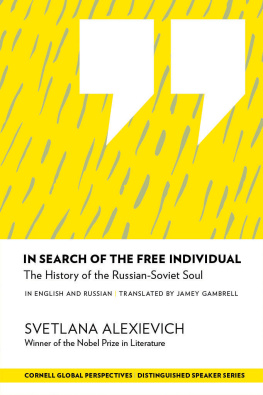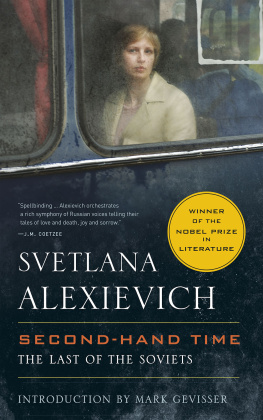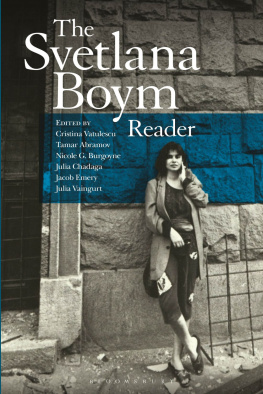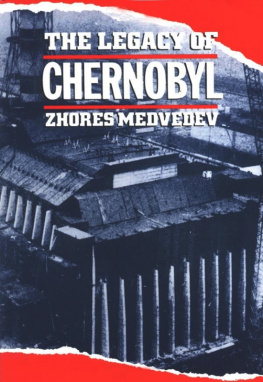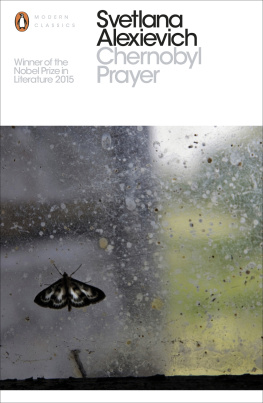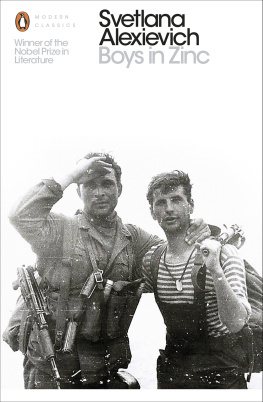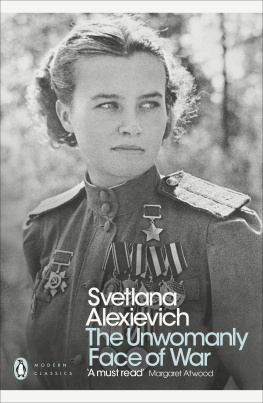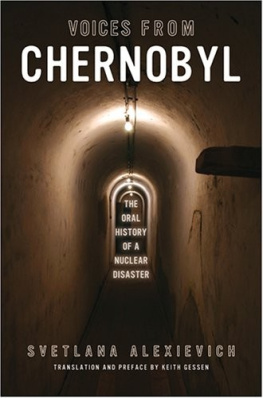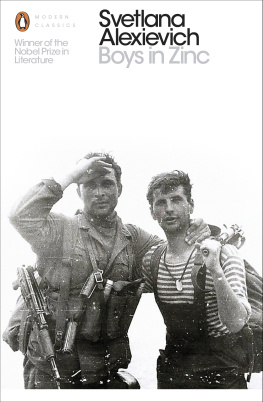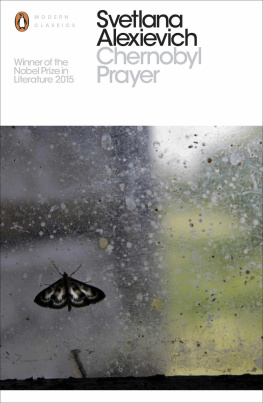Svetlana Aleksievich - Chernobyl Prayer: A Chronicle of the Future
Here you can read online Svetlana Aleksievich - Chernobyl Prayer: A Chronicle of the Future full text of the book (entire story) in english for free. Download pdf and epub, get meaning, cover and reviews about this ebook. year: 2016, publisher: Penguin Books Ltd, genre: Non-fiction. Description of the work, (preface) as well as reviews are available. Best literature library LitArk.com created for fans of good reading and offers a wide selection of genres:
Romance novel
Science fiction
Adventure
Detective
Science
History
Home and family
Prose
Art
Politics
Computer
Non-fiction
Religion
Business
Children
Humor
Choose a favorite category and find really read worthwhile books. Enjoy immersion in the world of imagination, feel the emotions of the characters or learn something new for yourself, make an fascinating discovery.

- Book:Chernobyl Prayer: A Chronicle of the Future
- Author:
- Publisher:Penguin Books Ltd
- Genre:
- Year:2016
- ISBN:9780241270547
- Rating:3 / 5
- Favourites:Add to favourites
- Your mark:
- 60
- 1
- 2
- 3
- 4
- 5
Chernobyl Prayer: A Chronicle of the Future: summary, description and annotation
We offer to read an annotation, description, summary or preface (depends on what the author of the book "Chernobyl Prayer: A Chronicle of the Future" wrote himself). If you haven't found the necessary information about the book — write in the comments, we will try to find it.
Chernobyl Prayer: A Chronicle of the Future — read online for free the complete book (whole text) full work
Below is the text of the book, divided by pages. System saving the place of the last page read, allows you to conveniently read the book "Chernobyl Prayer: A Chronicle of the Future" online for free, without having to search again every time where you left off. Put a bookmark, and you can go to the page where you finished reading at any time.
Font size:
Interval:
Bookmark:

Svetlana Alexievich
CHERNOBYL PRAYER A Chronicle of the FutureTranslated by Anna Gunin and Arch Tait

Contents
Some historical background
A lone human voice
The author interviews herself on missing history and why Chernobyl calls our view of the world into question
1
Land of the Dead
Monologue on why people remember
Monologue on how we can talk with both the living and the dead
Monologue on a whole life written on a door
Monologue of a village on how they call the souls from heaven to weep and eat with them
Monologue on how happy a chicken would be to find a worm. And what is bubbling in the pot is also not forever
Monologue on a song without words
Three monologues on ancient fear, and on why one man stayed silent while the women spoke
Monologue on how man is crafty only in evil, but simple and open in his words of love
The Soldiers Choir
2
The Crown of Creation
Monologue on the old prophecies
Monologue on a moonscape
Monologue of a witness who had toothache when he saw Christ fall and cry out
Three monologues on the walking ashes and the talking dust
Monologue on how we cant live without Tolstoy and Chekhov
Monologue on what St Francis preached to the birds
Monologue without a title: a scream
Monologue in two voices: male and female
Monologue on how some completely unknown thing can worm its way into you
Monologue on Cartesian philosophy and on eating a radioactive sandwich with someone so as not to be ashamed
Monologue on our having long ago come down from the trees but not yet having come up with a way of making them grow into wheels
Monologue by a capped well
Monologue about longing for a role and a narrative
The Folk Choir
3
Admiring Disaster
Monologue on something we did not know: death can look so pretty
Monologue on how easy it is to return to dust
Monologue on the symbols and secrets of a great country
Monologue on the fact that terrible things in life happen unspectacularly and naturally
Monologue on the observation that a Russian always wants to believe in something
Monologue about how defenceless a small life is in a time of greatness
Monologue on physics, with which we were all once in love
Monologue on something more remote than Kolyma, Auschwitz and the Holocaust
Monologue on freedom and the wish to die an ordinary death
Monologue on a freak who is going to be loved anyway
Monologue on the need to add something to everyday life in order to understand it
Monologue on a mute soldier
Monologue on the eternal, accursed questions: What is to be done? and Who is to blame?
Monologue of a defender of Soviet power
Monologue on how two angels took little Olenka
Monologue on the unaccountable power of one person over another
Monologue on sacrificial victims and priests
The Childrens Choir
A lone human voice
In place of an epilogue
Follow Penguin
PENGUIN MODERN CLASSICS
CHERNOBYL PRAYER
Svetlana Alexievich was born in Ivano-Frankivsk in 1948 and has spent most of her life in the Soviet Union and present-day Belarus, with prolonged periods of exile in Western Europe. She started out as a journalist and developed her own non-fiction genre which brings together a chorus of voices to describe a specific historical moment. Her first book, The Unwomanly Face of War (1985), chronicles the experience of Soviet women during the Second World War, while her second volume, Last Witnesses (1985), focuses on the same period seen through the eyes of Soviet children. They were followed by Boys in Zinc (1991), an account of the effects of war specifically the Soviet war in Afghanistan on soldiers, their families and society, and Chernobyl Prayer (1997), which features a series of monologues by people who were affected by the Chernobyl disaster. Her most recent book is Second-Hand Time (2013), a chronicle of post-Soviet life. She has won numerous international awards, including the 2015 Nobel Prize in Literature for her polyphonic writings, a monument to suffering and courage in our time.
Anna Gunins recent translations include Oleg Pavlovs award-winning Requiem for a Soldier (2015) and Mikail Eldins war memoirs The Sky Wept Fire (2012). Her translations of Pavel Bazhovs folk tales appear in Russian Magic Tales from Pushkin to Platonov (2012), shortlisted for the 2014 Rossica Prize.
Arch Tait has translated thirty books, short stories and essays by most of todays leading Russian writers. His translation of Anna Politkovskayas Putins Russia (2004) was awarded the inaugural PEN Literature in Translation prize in 2010. Most recently, he has translated Mikhail Gorbachevs The New Russia (2016).
We are air: we are not earth
Merab Mamardashvili
Some historical background
Belarus To the outside world we remain terra incognita: an obscure and uncharted region. White Russia is roughly how the name of our country translates into English. Everybody has heard of Chernobyl, but only in connection with Ukraine and Russia. Our story is still waiting to be told.
Narodnaya Gazeta, 27 April 1996
On 26 April 1986, at 01:23 hours and 58 seconds, a series of blasts brought down Reactor No. 4 of the Chernobyl nuclear power plant, near the Belarusian border. The accident at Chernobyl was the gravest technological catastrophe of the twentieth century.
For the small country of Belarus (population ten million), it was a national disaster, despite the country not having one nuclear power station of its own. Belarus is still an agrarian land, with a predominantly rural population. During the Second World War, the Germans wiped out 619 villages on its territory along with their inhabitants. In the aftermath of Chernobyl, the country lost 485 villages and towns: seventy remain buried forever beneath the earth. During the war, one in four Belarusians was killed; today, one in five lives in the contaminated zone. That adds up to 2.1 million people, of whom 700,000 are children. Radiation is the leading cause of the countrys demographic decline. In the worst hit provinces of Gomel and Mogilyov, the mortality rate outstrips the birth rate by 20 per cent.
The Chernobyl disaster released fifty million curies (Ci) of radioactivity into the atmosphere, of which 70 per cent fell upon Belarus. Twenty-three per cent of the countrys land became contaminated with levels above 1 Ci/km2 of caesium-137. For comparison, 4.8 per cent of Ukraines territory was affected and 0.5 per cent of Russias. More than 1.8 million hectares of farmland have contamination levels of 1 Ci/km or higher; roughly half a million hectares have strontium-90 contamination of 0.3 Ci/km or above. Two hundred and sixty-four thousand hectares of land have been withdrawn from cultivation. Belarus is a country of forests, but a quarter of its forests and more than half the meadows in the floodplains of the Pripyat, Dnieper and Sozh rivers are located within the radioactive contamination zone.
As a result of constant exposure to low-dose radiation, every year Belarus sees a rise in the incidence of cancer, child mental retardation, neuropsychiatric disorders and genetic mutations.
Chernobyl (Minsk: Belorusskaya
Next pageFont size:
Interval:
Bookmark:
Similar books «Chernobyl Prayer: A Chronicle of the Future»
Look at similar books to Chernobyl Prayer: A Chronicle of the Future. We have selected literature similar in name and meaning in the hope of providing readers with more options to find new, interesting, not yet read works.
Discussion, reviews of the book Chernobyl Prayer: A Chronicle of the Future and just readers' own opinions. Leave your comments, write what you think about the work, its meaning or the main characters. Specify what exactly you liked and what you didn't like, and why you think so.

